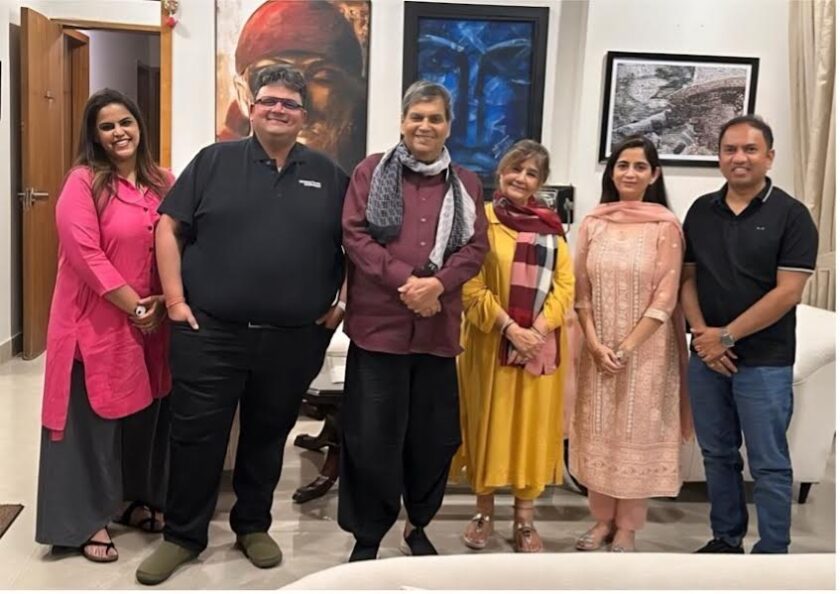Mumbai: Shyam Benegal, one of India’s most revered filmmakers, passed away at the age of 90. A pioneer of the Indian New Wave, Benegal’s cinematic vision bridged the gap between art and commerce, crafting narratives that resonated with the social fabric of the country. His films remain a testament to his commitment to realism, humanism, and storytelling that spoke to the heart of India’s societal and cultural challenges.
Early Life and Education
Born on December 14, 1934, in Hyderabad, Shyam Benegal grew up in a progressive family environment that fostered his interest in storytelling. His father, Sridhar B. Benegal, was a photographer, which exposed the young Shyam to visual arts early on. After completing his schooling in Hyderabad, he pursued a Master’s degree in Economics from Osmania University, where his fascination with cinema deepened.
Benegal’s career in filmmaking began with his association with advertising agencies, particularly Lintas. These early experiences honed his skills in visual communication, storytelling, and technical aspects of filmmaking. However, it was his work as a documentarian for the Films Division of India that shaped his unique style, blending visual eloquence with social realism.
The noted film director and screenwriter behind sensational movies such as Mammo (1994), Sardari Begum (1996) and Zubeidaa (2001), among others, heralded the Indian cinema movement in the 1970s and 1980s.
A Cinematic Trailblazer: The Parallel Cinema Movement
Shyam Benegal’s debut feature film, “Ankur” (1974), was a seminal moment in Indian cinema. It marked the advent of the Parallel Cinema movement, a genre that diverged from mainstream Bollywood’s song-and-dance routine to address the socio-political and economic realities of India.
“Ankur”, set in rural Andhra Pradesh, explored themes of caste, gender inequality, and feudal oppression. Featuring a young Shabana Azmi in her debut role, the film received critical acclaim and numerous awards, including the National Film Award for Second Best Feature Film. It also established Benegal as a filmmaker who could portray the intricacies of rural India with an authenticity seldom seen in Indian cinema.
This was followed by an illustrious string of films, including “Nishant” (1975), “Manthan” (1976), and “Bhumika” (1977), which cemented his reputation as a filmmaker deeply committed to social issues. Each film tackled themes ranging from rural empowerment to women’s emancipation and the complexities of human relationships.
Championing Stories of the Marginalized
Benegal’s films stood out for their unflinching portrayal of the marginalized. “Manthan”, for instance, was a groundbreaking film on the White Revolution in India, funded by contributions from dairy farmers across the country. It exemplified the power of collective storytelling, with ordinary people becoming stakeholders in their own narrative.
Another noteworthy film, “Bhumika”, drew inspiration from the life of Marathi actress Hansa Wadkar. With Smita Patil in the lead, the film delved into the struggles of an actress navigating patriarchy both in her professional and personal life. Benegal’s sensitive yet incisive lens made these stories compelling and universally relatable.
Collaborations and Mentorship
Benegal’s collaborations with a remarkable ensemble of actors and technicians were integral to his success. He introduced and nurtured talents like Shabana Azmi, Smita Patil, Om Puri, and Naseeruddin Shah, who became stalwarts of Indian cinema. His partnership with cinematographer Govind Nihalani resulted in visually striking films that elevated the storytelling.

Beyond films, Benegal’s mentorship extended to a new generation of filmmakers. He inspired many to challenge the conventions of mainstream cinema, advocating for authenticity and depth in narratives. His influence is visible in the works of contemporary filmmakers like Anurag Kashyap, Zoya Akhtar, and Nandita Das.
Forays into Television and Historical Narratives
In the 1980s and 1990s, Benegal expanded his storytelling repertoire with television. His series “Bharat Ek Khoj” (1988), based on Jawaharlal Nehru’s book The Discovery of India, became an iconic portrayal of India’s history and cultural heritage. Spanning 53 episodes, the series was an ambitious project that showcased Benegal’s ability to bring historical narratives to life with depth and accuracy.
Another notable television series, “Yatra” (1986), combined entertainment with education, chronicling the experiences of travelers aboard the Indian Railways. These projects reflected Benegal’s commitment to using the medium of cinema and television as tools for education and social change.
Recognition and Accolades
Over his illustrious career, Shyam Benegal received numerous awards and honors. He was conferred the Padma Shri in 1976 and the Padma Bhushan in 1991, recognizing his contribution to Indian cinema. The Dadasaheb Phalke Award, India’s highest honor in cinema, was awarded to him in 2005.
Benegal’s films won several National Film Awards and international accolades. His works were celebrated at prestigious film festivals, including Cannes, Berlin, and Venice. Beyond awards, his true legacy lies in the enduring impact of his films, which continue to inspire and provoke thought.
A Gentle Visionary
Despite his towering achievements, Shyam Benegal was known for his humility and unassuming demeanor. His colleagues often described him as a gentle visionary, a man who wielded his craft with precision and empathy. He believed in the power of cinema as a mirror to society and a tool for change, often saying, “Cinema is not just about entertainment; it is about engagement.”
Legacy and Influence
Shyam Benegal’s contribution to Indian cinema is immeasurable. He not only redefined the art of filmmaking but also paved the way for a socially conscious cinematic movement. His narratives, steeped in authenticity, continue to resonate in an age where storytelling often succumbs to commercial pressures.
Filmmakers, critics, and audiences alike will remember Benegal as a master storyteller who held up a mirror to Indian society. His films remain essential viewing for anyone seeking to understand the soul of India—its complexities, contradictions, and aspirations.
As the curtains fall on the life of this cinematic legend, his stories, and his vision will endure, lighting the way for future generations of storytellers. Shyam Benegal may have departed, but his cinema—a blend of art, activism, and humanity—will remain timeless.









